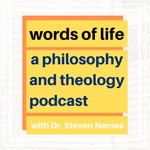
Words of Life (Steven Nemes)
Explorez tous les épisodes de Words of Life
| Date | Titre | Durée | |
|---|---|---|---|
| 19 Nov 2021 | Was Irenaeus a Roman Catholic? | 01:00:20 | |
Irenaeus is one very important figure from the early Church to which Roman Catholic theologians and apologists often appeal. They try to show that ideas such as apostolic succession, ecclesial infallibility, and even Roman primacy were known and wholeheartedly affirmed even as early as the second century after Christ. But does Irenaeus actually say the things that he is interpreted as saying? In this video, I provide a careful reading of Irenaeus's words in Against Heresies and put forth a Protestant response to the Roman Catholic theological and apologetic use of his ideas. I will try to show that, for Irenaeus, the true apostolic succession is doctrinal, there is no promise of infallible divine guidance applying to the teaching office of the Church, and the church of Rome has no special authority in theology simply as such. I will terminate with a consideration of the question: What would Irenaeus say about the Reformation? “Ad hanc enim ecclesiam propter potiorem principalitatem necesse est omnem convenire ecclesiam, hoc est, eos qui sunt undique fideles, in qua semper ab his, qui sunt undique, conservata est ea quae est ab apostolis traditio.” (AH 3.3.2) Dr. Steven Nemes received his PhD in Theology from Fuller Theological Seminary. His dissertation, titled “A constructive-theological phenomenology of Scripture,” was passed with distinction by Profs. Oliver Crisp, Veli-Matti Kärkkäinen, and Fr. John Behr. He has published a number of articles on a diversity of subjects in peer reviewed academic journals such as Journal of Analytic Theology, Journal for Continental Philosophy of Religion, Heythrop Journal, and Neue Zeitschrift für Systematische Theologie und Religionsphilosophie. | |||
| 20 Nov 2021 | Three Basic Principles of Phenomenology | 00:40:50 | |
Phenomenology is one of the most important and influential movements in contemporary philosophy, and yet it is also among the most difficult for the uninitiated to understand. My goal in this video is to introduce three basic principles of phenomenological philosophy of an ontological, epistemological, and methodological nature. The ontological principle asserts that consciousness is the arena of the self-disclosure of being. The epistemological principle asserts that knowledge is the achievement of judgment-evidence. The methodological principle holds that judgment-evidence can be achieved by means of the phenomenological reduction. By way of conclusion, I illustrate the phenomenological reduction and clarify the transcendental structure of world-experience. Dr. Steven Nemes received his PhD in Theology from Fuller Theological Seminary. His dissertation, titled “A constructive-theological phenomenology of Scripture,” was passed with distinction by Profs. Oliver Crisp, Veli-Matti Kärkkäinen, and Fr. John Behr. He has published a number of articles on a diversity of subjects in peer reviewed academic journals such as Journal of Analytic Theology, Journal for Continental Philosophy of Religion, Heythrop Journal, and Neue Zeitschrift für Systematische Theologie und Religionsphilosophie. | |||
| 22 Nov 2021 | Deconstruction and Faith | 00:50:45 | |
There has recently been a wave of “ex-vangelicals” who are publicly “deconstructing” their former faith and coming to new understandings of things. They are learning in real time that firm conviction does not always signal a perception of the truth. But I think the notion of “deconstruction” and its relation to faith has been very badly misunderstood, and in many places the discussion is dissatisfying. In this video, I am going to discuss the relation between deconstruction and faith. The “ex-vangelicals” and those riding the wave of “faith-deconstruction” misunderstand things in at least two ways. On the one hand, the situation is actually far worse than they take it to be. Not only is their former faith deconstructible, but in principle everything they believe is, too. On the other hand, this fact is not incompatible with Christian faith. Christian faith can be understood as a way in which living beings such as ourselves assert themselves and mold the world to a certain shape. Dr. Steven Nemes received his PhD in Theology from Fuller Theological Seminary. His dissertation, titled “A constructive-theological phenomenology of Scripture,” was passed with distinction by Profs. Oliver Crisp, Veli-Matti Kärkkäinen, and Fr. John Behr. He has published a number of articles on a diversity of subjects in peer reviewed academic journals such as Journal of Analytic Theology, Journal for Continental Philosophy of Religion, Heythrop Journal, and Neue Zeitschrift für Systematische Theologie und Religionsphilosophie. | |||